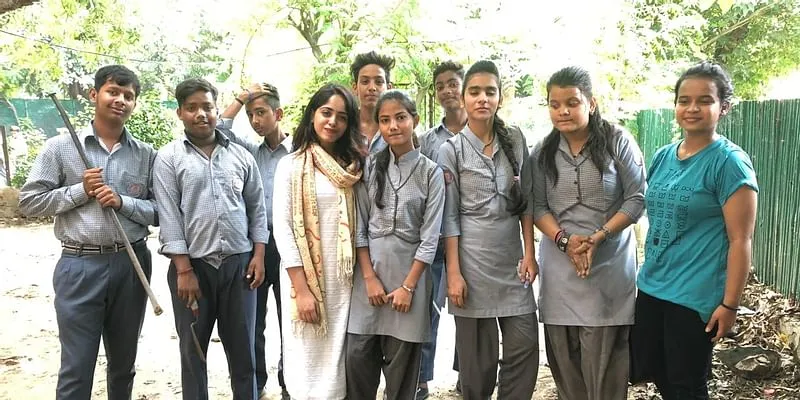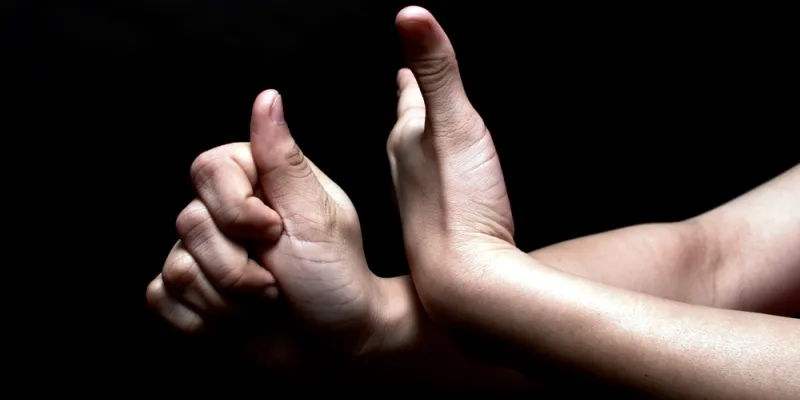This World Hearing Day, let’s take a decision to communicate and be truly inclusive
Devanshi Chhabra is an advocate for the d/Deaf and hard of hearing community. On World Hearing Day, she writes about the correct terminologies to use and how to best communicate with a person who is d/Deaf or hard of hearing, and what terms one should never use
Helen Keller said, “Blindness cuts us off from things, but deafness cuts us off from people.”
For me, as an advocate for the D/deaf and hard of hearing community and from my personal experiences as a person with hearing loss, it is an important day today: World Hearing Day with the motto for 2021, Hearing for All.

Devanshi during a planation drive at Delhi University Social Centre Co-Ed Secondary School
With my daily struggles and experiences, not only about channelising my own ways to pave the way for an accessible environment but at the same time raise voices for those who are unheard. One shouldn’t go through discrimination and inaccessibility because of the incompetence of our institutions to offer diversity in our own environment. I was five years old when I was diagnosed with hearing loss. Growing up with hearing loss, I have faced challenges in every step of the way. When I was in school, people would always ridicule, mock or tease me for my hearing aids as well as my speech and I gradually became more aware of the looks I received from those around me when my hair was up or when I asked someone to repeat what I said. I stopped wearing hearing aids and would never let people know about my hearing loss because I was scared of losing them but now, I wear them with pride.
Hearing is something that a lot of people take for granted. When I was in high school, I used to pretend to hear everything and hide my hearing aids before entering the class. I wanted to fit into a world where I would be accepted by people. Every time I try to indulge in a conversation with someone, I just go with the flow and not interrupt and do anything that calls for attention to my hearing loss. I felt so embarrassed because I didn't figure out how to deal with situations like this. I used to nod, smile and look interested in conversations. I used to laugh at the joke even though I didn’t understand or hear. Sometimes in group conversations, I didn’t want to be a burden and ask everyone to repeat everything, so instead I just smile and changed the conversation. I have been playing the role of hearing people just so that I feel included and accepted by others. I became the one who is always ready with a joke or laugh to distract that I didn’t hear the conversation. But I never became the D/deaf& hard of hearing one.
Hearing loss is an invisible condition and it affects our lives on a day-to-day basis. Deaf/Hard-of-hearing people are cut off from various forms of communication such as emergency warnings, hearing announcements at airports, or just an "excuse me" from a stranger.
Communicating with strangers is one of the most challenging and frustrating things that we had to go through. On the trip to the grocery store, shopping mall, flying to the airport, booking Ola/Uber, on a daily basis, whenever we come across a stranger, it becomes very frustrating and exhausting.
Whenever I ask them to repeat something, they may think I'm stupid or being rude or sometimes, they also not do not look at me directly and look away. I knew I had to figure out something. Instead of saying "What’’?, I now say “I have hearing loss. It's difficult for me to hear you. Could you please speak slowly and look me in the face so that I can understand you?"
Communication is a two-way approach. Always a person ask what type of communication method they prefer. No matter how you end up communicating, be patient. This process can be difficult from both the sides, so always ask them what the best way to communicate is.
The following are the four important aspects of hearing loss that need to reach a large number of people including governments, international NGOs, and development agencies, as well as all stakeholders in the field of hearing care.
COMMUNICATION:
Communicating with someone who has a hearing loss can be difficult. The following are some simple tips for communicating more effectively with someone who has a hearing loss:
- Face the person directly and make eye contact.
- Do not talk from another room
- Check background noise
- Make sure the lights are on and directly on your face so that they can lip-read.
- Always ask how they prefer to communicate.
- Speak clearly, slowly, and naturally, without shouting or exaggerating mouth movements.
- Say the person's name before beginning a conversation.
- Repeat/ Rephrase whenever possible
- Keep your hands away from your face while talking.
- Use gestures and body language.
- If the person has difficulty understanding a particular phrase or word, try to find a different way of saying the same thing like writing in a notebook or text message rather than repeating the original words over and over.
TERMINOLOGIES:
- Have you ever wondered about the terms that are used to identify or describe a person with hearing loss?
- Each term is different and means different things to different people depending on the level of their hearing loss, communication methods or cultural identity. How each individual identifies themselves is personal.
- Let’s take a look at each term and be mindful when using it.
- Deaf (uppercase D) ~ It is used to describe a group of people who have hearing loss and are identified culturally and linguistically as Deaf community. They have their own set of cultures, beliefs, traditions, and values. They prefer sign language as a means of communication.
- deaf (lowercase d) ~ It refers to the audiological condition of having hearing loss. They prefer to communicate orally and don’t use sign language. They don’t have a connection with Deaf community and prefer to communicate orally.
- Hard of hearing~ It refers to hearing loss ranging from mild to severe. They usually communicate through spoken language and can benefit from hearing aids or cochlear implants. They may identify as part of the Deaf community and culture or may prefer deaf or hard of hearing. They don’t know sign language because they were diagnosed later in life and don’t have any exposure to the Deaf community. But they can choose to learn or ignore it.
- The terms Hearing impaired, deaf-mute, deaf and dumb are offensive and not accepted or used by many deaf and hard of hearing people. When in doubt, always ask.
- Every individual is unique and wants to be treated with the utmost respect. We may be different but we are not less.
- If you are unsure about how someone identifies themselves, JUST ASK.

Image : Shutterstock
MYTHS:
Deafness is a hidden disability and has a diverse range of communities that are misunderstood because of a lack of awareness about terminologies and causes; as a result myths and stereotypes exist. Let’s debunk the myths about deafness:
- All Deaf people communicate through Sign language
Hearing loss community is diverse and it depends on a variety of factors such as level of hearing aids, whether they use hearing aids or cochlear implants, the age they were diagnosed, and educational background such as mainstream or special schools/colleges or family background. They have preferences for communication such as some people use spoken language, lip-reading or sign language or others use a combination of spoken and sign language.
- Hearing aids and Cochlear Implants (CI) restore our hearing to normal
Hearing aids and cochlear implants are useful for some deaf and hard of hearing people. It also depends on the specific type and degree of hearing loss. How well we hear with CI or hearing aids depends on the environment noise. So, it only helps us hear the sound and understand speech depending on various factors.
- Hearing loss occurs only in old age
It affects people of all ages and common causes of hearing loss include loud sounds, disease such as meningitis, head injury, hereditary etc.
- All d/Deaf and hard of hearing people can lip read
Lip reading is the art and the movement of lip patterns, face and tongue to understand what people are saying. Not all d/Deaf or hard of hearing people can lip read. Remember that lip- reading requires good eyesight and it’s impossible to lip-read in the dark. People mumble, people talk fast and laugh loudly, they have facial hair, they cover their mouths and they have accents. All of these make it impossible to lip-read.
- Talking loud and shouting is the only way D/deaf people can hear and understand.
Even if deaf people have access to hearing technologies, it is important to speak naturally and at a comfortable pace. Not too fast and not too slow. Shouting at us won’t help and it makes it harder for us to understand what is being communicated.
ACCESSIBILITY
When talking about accessibility for the person who is hard of hearing, one should remember that d/Deaf community is diverse and every individual has different needs.
•Caption your social media content.
•Provide text transcripts for audio content.
•We want to be able to hear even if it means hearing through captions in an emergency room, announcement at train/flight, or at a lecture.
•Sign language interpreters in schools, colleges, and public events.
•Provide Email address and other written materials.
•Wear a transparent facemask
According to the World Health Organization, hearing loss can be avoided through preventive actions and every individual should check their hearing regularly. We hope that World Hearing Day 2021 will be a massive call to action.
Edited by Diya Koshy George







